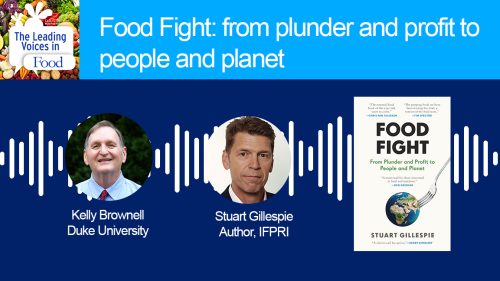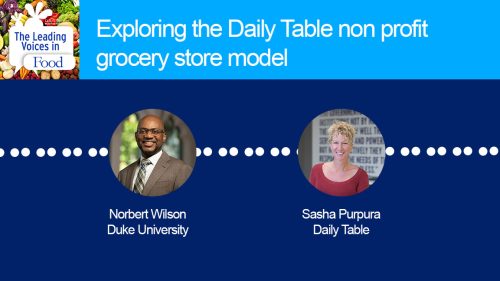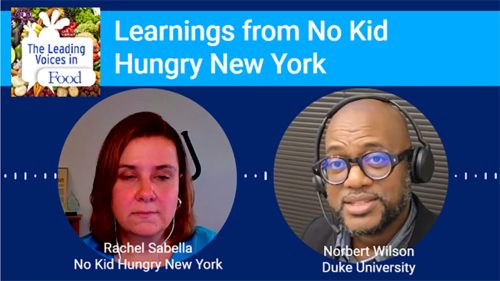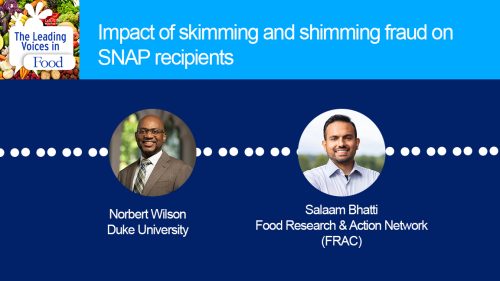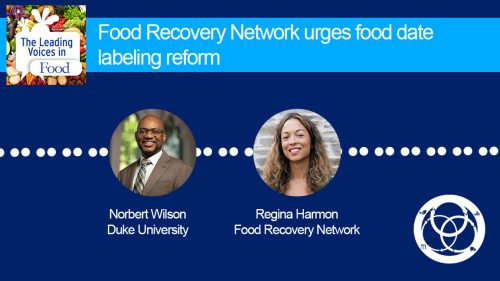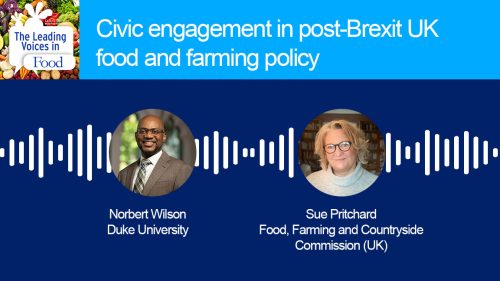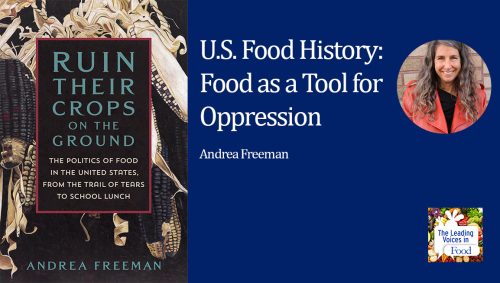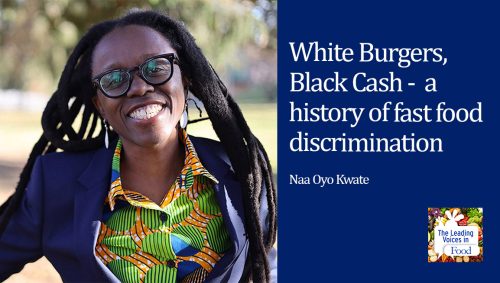The Leading Voices in Food
E224: Mississippi Delta History Describe Food Power Against and For Blacks in US
Stories from the past help us understand who we are and who we can be. In today’s podcast, we will explore a gripping new book titled “Food Power Politics: The Food Story of the Mississippi Civil Rights Movement,” written by African American Studies Assistant Professor Bobby J. Smith II at the University of Illinois at Urbana-Champaign. The book tells how food was used as a political weapon against African Americans and describes how black people fought against oppressive regimes by creating their own food systems, Bobby sets the stage for understanding how black youth today in Mississippi and beyond are building food justice movements and grappling with inequalities that attempt to contort their lives.
Subscribe: Apple Podcasts | TuneIN | YouTube Music | SoundCloud | PocketCasts | Radio Public
Tags: Equity, Race & Food Justice | Food Insecurity | Food System Narratives | History & Food |

Dr. Bobby J. Smith II is an interdisciplinary scholar of the African American agricultural and food experience. Trained as a sociologist, with a background in agricultural economics, Dr. Smith is an Assistant Professor in the Department of African American Studies at the University of Illinois at Urbana-Champaign, with affiliations in the Department of Food Science & Human Nutrition and the Center for Social & Behavioral Science. He is the author of Food Power Politics: The Food Story of the Mississippi Civil Rights Movement (University of North Carolina (UNC) Press, 2023), the inaugural book of the newly launched Black Food Justice Series at the University of North Carolina (UNC) Press. Dr. Smith earned a B.S. degree (summa cum laude) in Agriculture, with a focus on Agricultural Economics, from Prairie View A&M University in 2011. He earned a M.S. degree in Agricultural and Applied Economics in 2013 and a Ph.D. in Development Sociology in 2018 from Cornell University. Most recently, Dr. Smith has been awarded fellowships from the American Council of Learned Societies (ACLS) and the National Endowment for the Humanities (NEH), among others.
Interview Summary
So, Bobby, what inspired you to write “Food Power Politics?”
So many different ways to answer the question. I have a family background in agriculture. I did food justice activism while I was in graduate school. I also worked on food policy councils. So, I was inspired to write it because I was already interested in understanding the ways in which food was produced, consumed, and distributed. But what inspired me to write “Food Power Politics” was actually a class I took while I was in graduate school at Cornell University in the Department of Developmental Sociology. I’m taking a course around community development and organizing and we read a book by sociologist Charles Payne entitled “I’ve Got the Light of Freedom.” It’s about the Civil Rights Movement in Mississippi, particularly the area called Greenwood, Mississippi in the Yazoo Mississippi Delta Region of the state of Mississippi, which is the northwest quadrant of the state. And in the book, Payne talks about the organizing tradition of the Civil Rights Movement. And during that class, I’d already been interested in understanding, again, issues of food justice and food security. So, as I was reading that book, I learned about the ways in which food became a weapon used against the Civil Rights Movement and civil rights activists responded by organizing their own food programs. And essentially, I wrote “Food Power Politics” because I wanted to raise awareness about how food can be used in different ways. But I also wanted people to rethink the idea of food. Many times, people think about food as something that’s on your plate or something you get at the grocery store. But what inspired me to write “Food Power Politics” was to show a different story about food and how it impacts the lives of African American people.
Thank you for that. And I have got to tell you, I’m intrigued by the phrasing of “Food Power Politics.” Could you please unpack its meaning and explain how you map it across the landscape of Black life?
“Food Power Politics” is the title of my book, but it’s also the theoretical framework that I created to begin to understand, or for scholars and other people to interpret, how food can be used as a weapon. The book started as ideas for my dissertation. When I first learned about the ways in which food had been used as a weapon against African American communities, I started looking to the literature to find out how have people talked about food as a weapon. I remember talking to a number of my colleagues about the book itself and they were telling me stories about how the idea of food as a weapon is just what we call wartime tactics. So, food has been weaponized for many, many years, and centuries. So, I went to the literature, and I found out that scholars, typically legal scholars, historians, and political scientists, when they talk about how food when used as a weapon, they use the term food power. I had never heard of food power before or this framework of food power. So I, of course, as a diligent graduate student, delved into the literature and learned more about food power. And it’s a concept that is usually understood in the context of international conflict whereby one nation withholds food from another nation in times of conflict as a way to mitigate the impact of the conflict, or that the nation that wills the power against another nation can win the conflict. That’s what they call food power. So, I used the concept of food power and transposed it into the context of the Civil Rights Movement. And while I was studying the Civil Rights Movement, food power allowed me to think about how food had been used as a weapon against African communities, but it didn’t allow me to pick up on how African American communities fought back. And that was a key part for me because many times when we think about times of oppression or social struggle, we tend to think about how oppressors oppressed people and not have those who are oppressed fight back. So, when I observed what African American communities were doing in Mississippi in response to food being weaponized against them, I theorized ideally emancipatory food power, which allows or creates this way for us to understand how African American communities use food as a way to emancipate themselves from those kinds of conditions and circumstances. So, the conflict between food power and emancipatory food power equals or is a sense is where I theorize as “Food Power Politics” which captures those struggles. I didn’t want to show just one side of the struggle by which food is used against African American communities. I wanted to show both sides. And that’s what the concept of “Food Power Politics” seeks to do. It gives us language to understand these instances, whether it’s during times of enslavement in the African American experience or in times of Jim Crow or civil rights or even today. It gives us language to understand the ways in which food is used in times of social struggle.
This is really rich. I’m so intrigued by the idea of taking from geopolitical conflict, this notion of food power and this idea of food power against, but you also talk about food power for, and that was an important move because it shows how people can take possession of their lives and use food, that can be so complicated, for their good. And so, I hope we’ll talk a bit more about that. But I really want you to take us back in time. So, what is the food story of the Mississippi Civil Rights Movement and why do you think it’s important?
So, thinking back when I talked about Charles Payne’s piece, “I’ve Got the Light of Freedom.” He talks about how food was used as a weapon against African American communities. So, although Charles Payne’s book is not about food, it’s not about agriculture. It’s a strictly civil rights, Black Freedom Struggle type of book. But in chapter five of the book, he recounts this moment activists now called the Greenwood Food Blockade. And the food story of the Mississippi Civil Rights Movement, or the story that I want to tell, begins with this Greenwood Food Blockade. In short, it is this moment where the White political structure there in the Yazoo Mississippi Delta Region through the city of Greenwood, Mississippi, in Ford County, is where they begin to use food as a form of voter suppression. So, there’s this federal surplus commodities food program. Government cheese, or government peanut butter, meats, and things like that. At the time in the Delta Region of Mississippi, that program was a big program for rural African American communities. In 1962, the Florida County Board of Supervisors decides to dismantle that program. And that was the only way that our poor world Black communities were able to even get food. Many of them were sharecroppers or farm workers or day laborers, and many of them didn’t have any money to buy foods. So, all the food they got and the ways in which they fed themselves was mostly through this federal surplus commodities program, which is what they call the Surplus Food Program. So, in 1962, the Florida County Board of Supervisors in November of 1962 decide to dismantle the program as a form of voter suppression. So, what ends up happening is that now activists who are in Mississippi begin to make connections between food and the struggles of sharecroppers. And so essentially the food story of the Mississippi Civil Rights Movement begins with this event called the Greenwood Food Blockade. And in response to the blockade, activists organized what they call the Food for Freedom program. So, that’s one of the first times we see these tensions between food power against and food power for. The blockade itself is one where food power is used against these communities. And then the Food for Freedom program is designed to respond to that lack of food that is engineered by the Greenwood Food Blockade. That’s my entry point and that’s how I even found out about this food story of the Mississippi Civil Rights Movement. And in 2017 when I was a graduate student, I went to Mississippi to learn more about the Greenwood Food Blockade. I wanted to locate activists who knew about it. I went to the places where the Food for Freedom program operated, and I learned so much about the Greenwood Food Blockade. But while I was in Mississippi, I also learned about another part of this story. So, during the Greenwood Food Blockade, while activists are responding to this use of food as a form of voter suppression, there’s also this food stamps campaign that is engineered by White grocery store owners in the Delta and across Mississippi. Now, I call it a food stamps campaign because in 1962, our nation did not have a Federal Food Stamp program. It was a pilot program at the time. White grocery store owners in Mississippi wanted food stamps, but not food stamps to feed people; they wanted food stamps to make profit. They also wanted to get rid of the federal surplus commodities food program because they believed that that program would cut into their profit. So, once I learned more about this Federal Food Stamps campaign in Mississippi, I soon learned that another way in which food had been used as a weapon against African American communities was also through the Federal Food Stamp Program. The Greenwood Food Blockade is food as a political weapon. And then this Federal Food Stamp campaign by White grocery store owners is food used as an economic weapon, and how activists and how sharecroppers in those communities responded to that campaign was how they developed food cooperatives. Throughout each chapter of the book, I provide a case study of how food is used as a weapon against African American communities and how they respond. But they respond in different ways because when it’s a political situation, they respond by attaching food to civil rights activism and freedom. Whereas the food stamps, they realize whether we have surplus commodities or whether we have food stamps, we can’t control when, where, and how we access food. In response, they start developing these food and farm cooperatives in Mississippi, and that’s the way we see how food can be used as a weapon against, but also how being those communities counter weaponized. And then I follow that story and situate it through today and show how particularly Black youth in the Delta today continue the food story of the Mississippi Civil Rights Movement, recognizing that things are different today and that a lot of the power structure has morphed to fit today’s context. But communities are still struggling to counter weaponize the ways in which food has been used against them.
You are already leading into the next line of questioning and that’s this idea why your text mostly is about historical events. You do, of course, bring it to today. And I’d like to hear you talk about this. How do you envision your book contributing to the contemporary work of food activists and their communities?
Honestly, when writing books or articles, you never know who might have access to it or who might get it. And my hope for at least communities or those who are actually on the ground doing the work around food justice or food sovereignty or any type of food movement, I want them to use the book as a part of their arsenal of stories to develop blueprints to think about the future. The reason why I wanted to end the book with thinking about Black youth, because the Black youth that I studied in the book, they were directly continuing this food story of the Mississippi Civil Rights Movement, which also showed me that there’s some unanswered questions left from the past that we still need to address if we’re going to create this socially just food futures. I’m hoping that my book can be used by activists to show them that they’re not by themselves. In fact, they’re part of a legacy, a genealogy if you will, a lineage of people who have always put food at the center of social struggle to think about how can we ensure that everybody is food secure? I couldn’t leave the book in the civil rights era. I wanted to think about how people today, so the rural Black youth that I write about in chapter four in the book, they continue this story, but they’re thinking about how can we, one, reclaim the past but also make it fit today? The local foodscape of the Delta is different now, back then, the Delta’s Foodscape was shaped by mostly commissary stores and a few grocery stores as well as these plantation stores. And they all worked together to create this type of food outlet or food environment for to be poor world Black communities. But today we have a prevalence of corner stores, a prevalence of liquor stores, dollar stores, and those type of stores that carry cheap and highly processed foods or even no foods. And that’s the foodscape by which activists are navigating today in the Delta. And I wanted to create a type of book that could help them think about how we can use history as a way to shape our strategies? Because while I tell the food story of the Mississippi Civil Rights Movement, there’s a food story of the Alabama Civil Rights Movement, a food story of the North Carolina Civil Rights Movement. And I want to give people permission to begin to excavate those stories and think more about how it relates to the work they’re doing today.
That’s really helpful. I mean, you clearly have an eye toward the public to say, “What can folks who are on the ground doing the work of trying to fight for food justice pull from the past to use as strategy, as motivation, as even hope?” And I really appreciate that. Now I want to shift gears and talk a little bit about policy because I’m at a policy center and I’m interested to understand what we can learn about current conversations about federal, agricultural or food policies, given what you say?
I appreciate this question, Norbert. So, next year marks 60 years since Lyndon B. Johnson signed the Federal Food Stamp bill, which created food stamps. We call SNAP today the Supplemental Nutritional Assistance Program. What does it mean to think about food stamps 60 years later? My book provides an untold history, if you will, about the food stamp program. When many people think about federal food policies, they think about these policies as a way to ensure that people get something to eat. People need these programs to get access to groceries, get access to foods from a number of places. But historically, these food policies and ag policies were not necessarily designed to impact the public at large. And I think it’s important for us to understand it as we think about how we’re going to revise these programs to ensure that they’re meeting the needs of the actual recipients. What we do know about food stamps is that in the past, it was designed while Lyndon B. Johnson and others argued in the 1960s that it was a part of this larger war on poverty and that it would help people get out of poverty. But food policies are not necessarily designed to get people out of poverty. It doesn’t necessarily give them more actual money for them to take care of other things in their lives. Now, while it gives them some type of supplemental food assistance that then could possibly increase their income, it doesn’t give them direct aid. And what I want my book to do is for us to begin to complicate how we think about ag and food policies and recognizing that while on the surface or when we read the legislation, it’s designed to do X, Y, and Z, what actually happens and what we do know in the 1960s after the Federal Food Stamp program is passed, and it comes in Mississippi, people become more food insecure in Mississippi. And that’s interesting to understand because people think when food stamps come to Mississippi, oh, now everybody can eat. And in fact, civil rights activists were saying, “Actually, no, we can’t even eat now because you have these requirements.” And that’s also what we’re seeing today. Activists have been organizing to shift the requirements of what it means to get SNAP or what it means to get food aid. And year after year or every five years under the Farm Bill, it gets harder and harder for people to get something to eat. But somebody’s still making money from these policies and I’m hoping that my book provides at least an entry point or a window into complicating those conversations. I mean, if the goal is to feed people through food policy, then I’m hoping that we can learn this history, learn from it and as a way to revise what’s going on presently to impact the future.
As you know, USDA just released its most recent estimates of food insecurity in the United States and there’s been an increase.
Yeah, I saw that. Yeah.
Yeah, and the fact that we’re now in the conversation around the Farm Bill and what’s going to happen there. I think there’s some important policy conversations that need to take place. And one thing, of course, given the origins of your book and where you’re located, in addition to thinking about the policy, there are racial and societal concerns that also crop up. Thank you for exploring these issues and trying to recognize the complexity of the lives that we live. So, I appreciate your project there.
Thank you for framing it the way that you did. I’m glad you borrowed the food insecurity increasing because it’s important to recognize that nationally, it’s gone up. So, what does that mean for those demographics that were already disproportionately impacted by food insecurity? Thank you for bringing up that particular point.
I understand that your book is the inaugural publication of the newly launched Black Food Justice series at the University of North Carolina Press. That’s wonderful. Congratulations.
Thank you. I appreciate that.
My last question for you is how do you see your book reshaping our understanding of food justice?
I’ve been thinking a lot about food justice, at least for the past 10 years. And in many conversations about food justice, there’s been an explicit focus on thinking about race, but mostly thinking about race in the context of what we called the local food movement. So many of us, even myself, have argued before about how the local food movement is overwhelmingly White and overwhelmingly affluent and that poor people or people of color or Black people can’t even get access to the movement. And while that was important, some maybe five years ago thinking about food justice, what my book shows is that the story of food justice or the development of the movement has deep roots in the arc of the Black Freedom Struggle in the United States. And I think that’s important because when we begin to think about food justice, we tend to automatically connect it to the Environmental Justice Movement of the 1970s and 1980s. And what my book shows is that in fact, Black folks have been doing food justice since they were enslaved. They just didn’t have the language to call it food justice because they were just attempting to survive. They were trying to make new worlds in a strange world they were brought to when they were enslaved because there wasn’t any knowledge. So, what my book shows or extends or what it does or what it begins to reshape, if you think about this idea of food justice, is that it shows that there’s more to food justice than just an opposition to local foods or just opposition to the absence of Black people at farmer’s markets and CSAs. In fact, food justice has a deep history in how Black people reimagine their worlds and how they put food at the center. And I believe that’s what my book does. It reshapes our understandings of food justice, and it provides concrete examples of how food justice morphs with the times. How it looked during times of slavery versus Jim Crow versus civil rights versus current that we find ourselves in. In the sense, what I’m attempting to do is I’m showing how it connects food justice connect to civil rights, but also, I’m showing more largely how the food justice movement, in many ways, African Americans provide the blueprint for understanding how we can achieve food justice in our nation and around the world today.

